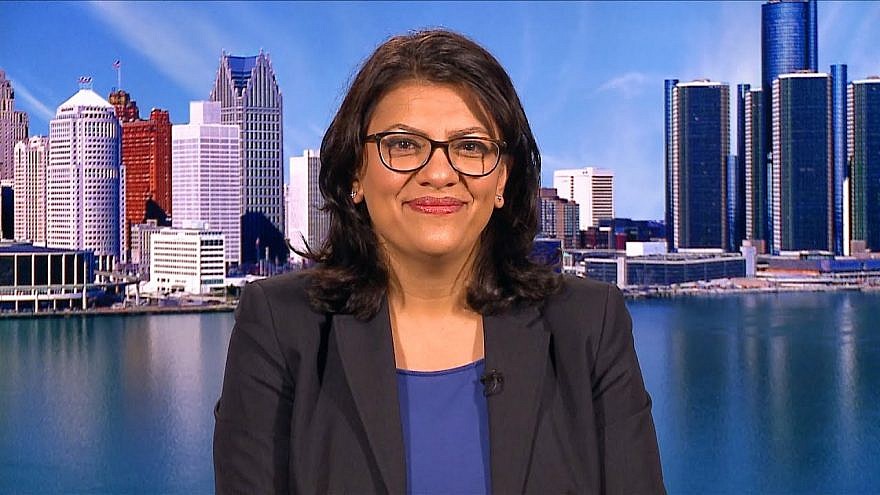Rep. Rashida Tlaib (D-Mich.) squawked on the floor of the U.S. House of Representatives last May, “How many Palestinians have to die for their lives to matter?”
Madam Congresswoman, would they still “have to die” if they ceased attacking Israelis? Who says that their lives do not matter?
Tlaib, whose family moved from the West Bank to Michigan prior to her birth, was quoted thus in Sunday’s New York Times Magazine. However, “author” Rozina Ali neglects to explain the context at that point in the article. Nor does she question how their lives do not matter.
Ali crams her article with more than a dozen distortions, blanket generalizations and baseless allegations which would fit in inside a propogandizing Arab-backed publication, but in The New York Times? Advocates for Israel have for long accused the Times and other major newspapers of biased reporting of Israel.
Those who call the article shoddy journalism give the Times too much credit. The article is shoddy, but is it journalism? Minimal balance, little context, no facts to support sweeping accusations. The Times should never have published the article as is. The editor should have returned the article back to Ali and demanded explanations of assertions from Tlaib and the author herself.
Or was there an editor? It is as if she handed the article directly to the production crew, bypassing the magazine’s copy editors. The media watchdog CAMERA, the Committee for Accuracy in Middle East and Analysis, has also identified some problematic passages.
What sticks out in the article are these sentences: “Over her three years in Washington, Tlaib’s argument has sharpened: If the United States cares about democratic values, then upholding Palestinian rights is inherently American.”
Since Tlaib is concerned with “democratic values,” we must remind both Ali and Tlaib that in summer 2000 Yasser Arafat rejected an Israeli proposal to transform the Palestinian territories into an independent state. Arafat’s decision contradicted the advice of his aides and was made without benefit of consideration by a Palestinian legislature as might happen in America.
Creation of a Palestinian state would have allowed the Palestinians to elect a government that would render decisions based on the will of the people.
And, what do they mean by “upholding Palestinian rights?” Wouldn’t an editor have told Ali to explain what this meant?
During her 2018 campaign, Tlaib told The Washington Post, “We need to be not choosing a side.” She doesn’t?
Ali also omits pertinent facts when she writes, “She grew up hearing stories of family members being forced out of their homes. At age 12, she visited the West Bank and saw for herself the walls and checkpoints.”
It is well documented that Israel established checkpoints throughout the West Bank to inspect Palestinian vehicles for security purposes and built walls and fences along the territorial borders to prevent terrorists from crossing the border into Tel Aviv, Haifa, and other Israeli cities.
Ali’s article reports that Tlaib colleague Rep. Betty McCollum of St. Paul, Minn., introduced a bill to limit American aid from being used to send Palestinian children to military prisons. I have heard this allegation several times, but activists for the Palestinians have yet to explain what they are talking about.
Especially galling is Tlaib’s comparison of Palestinians to Detroit’s Black community. Ali writes, “Tlaib speaks about the occupied Palestinian territories in the context of Detroit, pointing to issues of water access in both, comparing their patterns of segregation and poverty. ‘I don’t separate them,’ Tlaib told me. Both places have ‘what I call othering politics,’ she said, ‘or feeling like government or systems are making us feel less than.’”
The conditions of African-Americans and Palestinians are more a matter of contrast than comparison. The Black community wants access to voting, quality schools, safety, better job opportunities, shared power and respectful treatment. Many Palestinians, though certainly not all, seek to subjugate Jews in Israel or kill them.
Elsewhere in the article, Ali writes that in 2014 “Israel launched a major military operation in the Gaza Strip after the kidnapping and murder of several Israeli teenagers by the Hamas militant organization. Social media was flooded with testimonials and videos of Israeli airstrikes, which killed nearly 1,500 Palestinian civilians (six Israeli civilians were killed by Hamas rockets).”
Israel launched? No, Hamas launched a missile attack and Israel responded. The casualty rate might have been a tad lower in Gaza if Hamas had built bomb shelters for its citizens as Israel sees fit to do for its own. Additionally, Israel uses its Iron Dome system to repel Hamas rockets.
Ali is identified as “a contributing writer at the magazine. She is working on a book about the history of Islamophobia in the United States.”
The Times’ Middle East coverage is often condemned by many in the Jewish community. I sometimes find problems with it, though my criticisms are hardly as harsh as others. If the Times triggers credibility questions with one issue, and particularly Ali’s magazine article, then what about other areas of news coverage? The Times creates a slippery slope for itself it when publishes an article of this kind.
How many more specious articles must the Times publish before balanced reporting matters?
Republished from San Diego Jewish World


























